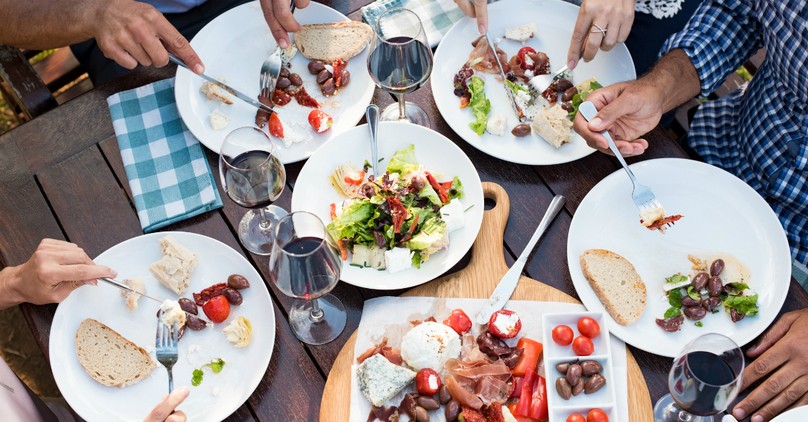
Gluttony is just for people who bear the signs of gluttony, right? Wrong. The online Google dictionary defines gluttony as, “habitual greed or excess in eating”. No one wants to identify with that definition, but have you ever eaten so much that you feel uncomfortable? I think we all can admit that.
If it isn’t the commercials and advertisements everywhere pointing us to crave a particular food item, and oh, by the way, lots of it, our flesh is willing to oblige in that craving.
God gave us taste buds, after all, so food was intended to be pleasurable. But sometimes, this can be an obstacle for us, and before we know it, we are eating more than we need because our wants control our appetite more than our physical needs do.
Some signs that we might be gluttons are apparent if we are gaining weight, but gluttony is more about our hearts than it is our external appearance. People can be thin and still be gluttonous. Here are some signs to watch out for and tips to help you be healthier and curb gluttonous cravings when they strike:
Photo Credit: ©GettyImages/Ridofranz
1. I'll Second That
“If you have found honey, eat only enough for you, lest you have your fill of it and vomit it” (Proverbs 25:16, ESV).
Sometimes we really enjoy the food (at parties, especially), where many of the favorites are available in abundance, but sometimes when there is too much available, we can be prone to get more than we need and go for seconds. While this can compliment the chef, it can also pose a problem for the host when they are feeding a large crowd.
The desire for seconds is understandable. Science shows that eating feeds “feel good” hormones in our brains. The endorphins can cause us to want to continue that party in our mouth, but if we recognize this stimulation for what it is, we can pause and recognize that going for seconds might be greedy and gluttonous.
Tip: Eating slower helps us to actually taste the food and enjoy it, rather than eating fast, which curbs the desire for seconds.
2. Leftovers
“But put on the Lord Jesus Christ, and make no provision for the flesh, to gratify its desires” (Romans 13:14, ESV).
Leftovers can be such a blessing (and all the mommas said ‘amen!’). It means no cooking. But, sometimes, they can also be a source of temptation, and when we crave leftovers just because we want them, rather than waiting for mealtime, we might be acting out of gluttony.
Tip: Sometimes I purposely give all my leftovers away (or the ones that tempt me most), so I don’t cave to the craving. Another tactic is to place leftovers in containers in the back of the fridge so they are harder to get to and less visible.

3. Portion Distortion
“They tested God in their heart by demanding the food they craved” (Psalm 78:18, ESV).
As I have gotten older, I realize that my body does not need as much as it craves. It’s a bummer, y’all, but it is true. As we age, our caloric needs decline, but our desires might not. This can also lead to gluttony. But God has shown me that I need to be content with His portion for me—the portion that is fitting for my needs. Craving someone else’s portion and what they are able to eat is—you guessed it—a sign of gluttony again.
Tip: My husband and I will typically split a meal when we eat out as restaurants serve large portions. This helps us to both be accountable and content with a smaller serving size. (It's an easy money-saver too!)
4. Got the Munchies
“Or do you not know that your body is a temple of the Holy Spirit within you, whom you have from God? You are not your own, for you were bought with a price. So glorify God in your body” (1 Corinthians 6:19-20, ESV).
Snacking can become problematic when we are not aware of how much we are actually consuming. We can associate certain activities with food and feel deprived if we don’t have popcorn with a movie or our favorite snacks while working.
Tip: Have set times for eating and a set location. This limits the amount you will eat compared to if you were bringing the food to different locations.
Photo Credit: ©Unsplash/Ursula Spaulding
5. Party in Your Mouth
“So, whether you eat or drink, or whatever you do, do all to the glory of God” (1 Corinthians 10:31, ESV).
Sometimes our mouths can feel bored, and we go to food for entertainment. We might not even be hungry, but we just go to food for comfort or enjoyment. This can be problematic for our health, but also foster a gluttonous spirit, where we just eat because we want to, not because we need to.
Tip: Be intentional about your eating times and set out healthy snacks for the day in proper portion sizes. I will set out 100-150 calorie snacks on my counter and eat them every 2.5-3 hours, which is a way to keep energy levels up without overeating. Our body adjusts to the caloric intake we provide, even though it might be difficult to adjust initially.
6. Sticking to a Diet
“So I say, let the Holy Spirit guide your lives. Then you won’t be doing what your sinful nature craves. The sinful nature wants to do evil, which is just the opposite of what the Spirit wants. And the Spirit gives us desires that are the opposite of what the sinful nature desires. These two forces are constantly fighting each other, so you are not free to carry out your good intentions” (Galatians 5:16–17, NLT).
Good intentions pave the way to chocolate sometimes. I have rationalized my battle with diets because I have not seen the sin in that fight. Idolizing food or eating more than I need hurts my health. Self-control is a fruit of the Spirit, but we often try to fight our battles in the flesh. The struggle is real when it comes to sticking to a diet, but we need not starve ourselves to be healthy.
Tip: Recognize eating habits as a spiritual matter. Walk in the Spirit rather than the flesh. Pray and ask for accountability to overcome strongholds in your eating.

7. Premeditated Binge
“The one who keeps the law is a son with understanding, but a companion of gluttons shames his father” (Proverbs 28:7, ESV).
If you are fantasizing about a feast coming up or plotting a time when you can enjoy a lot of your favorite foods alone, gluttony might be a problem. And sometimes that problem is enabled by others who want us to do that with them. Have you ever been in a group, and someone looks at you with a glimmer in their eyes asking if everyone wants to cheat on their diet? We laugh and think it’s funny, but gluttony is no laughing matter. It can keep us in bondage to food when food was meant to fuel us, not be our delight.
Tip: Find friends who don’t struggle with gluttony and encourage one another to eat for health, not just for pleasure. Also, consider sharing healthy recipes with each other that are not only nutritious but taste amazing!
God provides food for us to enjoy and to take care of our bodies, which are a temple for the Holy Spirit. At the root of gluttony is sometimes boredom or unsettling emotions that cause us to run to food for comfort. But misusing food will not do us any favors and might create a host of health problems, instead. When you feel tempted to eat more than you need, pray, and ask God to help you resist that temptation. It will get easier to overcome cravings when we adopt healthier habits instead.
Photo Credit: ©Getty Images
Originally published Monday, 16 May 2022.



